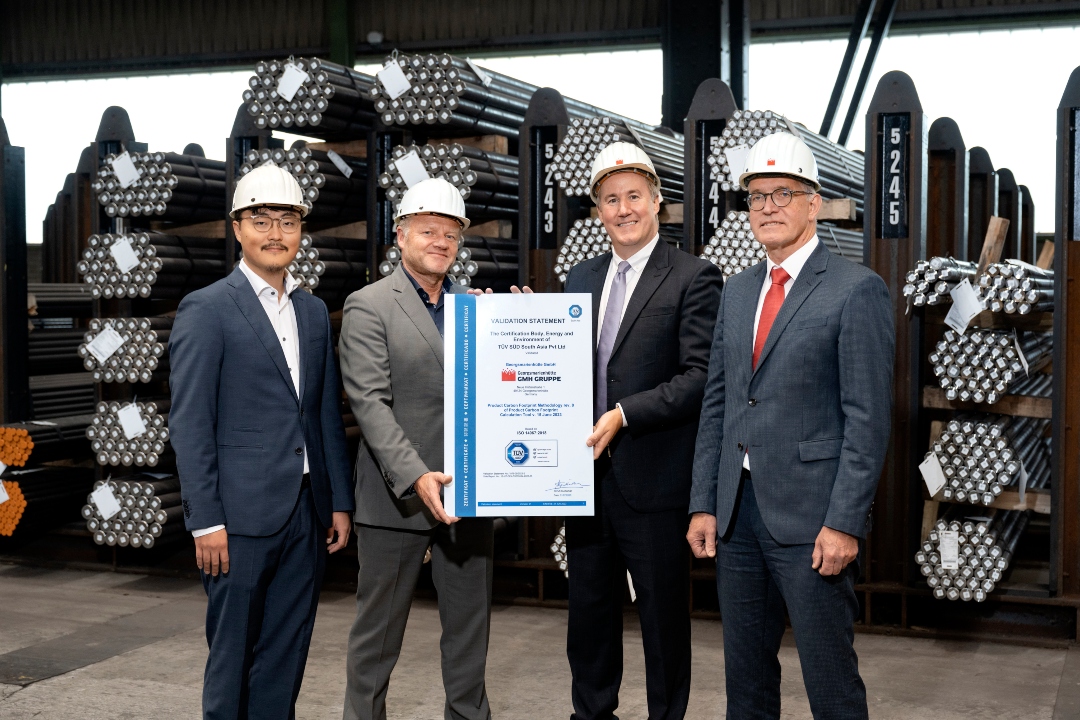The algorithm used to calculate the Product Carbon Footprint (PCF), which GMH has adapted to its own requirements, takes into account in great detail all CO2 emissions from the raw materials used to the provision of the product at the GMH factory gate in accordance with the system boundaries (“cradle to gate”).
As one of the forerunners in the production of Green Steel in Germany, GMH continues to see itself as a driver of decarbonization in the steel industry. The sustainability efforts offer great opportunities for both the company and its customers. The precise and, above all, comprehensible calculation of the PCF plays a key role in this. Georgsmarienhütte GmbH now makes this information available to customers who want to demonstrably improve their carbon footprint with more than a thousand variations of steel. GMH refined the algorithm to match the extremely complex calculation of the PCF according to the company´s specific requirements. The underlying data evaluation for these enhancements could only be processed because GMH started to digitalize all its processes years ago. The calculation methodology complies with the ISO 14067 and 14044 standards and follows the Greenhouse Gas Protocol specifications for greenhouse gas emissions accounting and associated reporting for companies.
Through its validation, TÜV SÜD has confirmed the conformity of the PCF calculation methodology used by GMH with the normative requirements. This means that the carbon footprint of the steel variants produced at Georgsmarienhütte GmbH can be transparently and accurately represented during all production steps in accordance with the “Cradle to Gate” system limits. This consideration begins with the raw materials used and ends with the provision of the finished products at the GMH plant gate.
“We are very proud to have received this validation from TÜV SÜD. As a pioneer in steel production with electric arc furnaces and a reliable partner for our customers, we can now offer probably the most accurate PCF calculation on the market,” says Frank Düssler, Director Transformation & Regulation at GMH.
GMH’s validated PCF calculation methodology shows in great detail (“granularity”) which PCF the respective GMH products have, in order to be able to prove the sustainability of the supply chains. The level of detail for each product is particularly noteworthy, as average values and statistical data are often still used for PCF calculations.
“We are pleased to have been able to support the GMH Group in terms of a transparent and confidence-building decarbonization strategy. We have validated the data collection and the PCF calculation methodology and thus confirm the conformity with the normative ISO and GHG Protocol requirements,” says Andreas Schubert, Manager Green Production & Decarbonization at TÜV SÜD.
New “Green Steel” portfolio from GMH
The precise PCF calculation can now be applied to each individual product from the GMH portfolio and each individual production batch. It thus enables classification into different steel categories. GMH customers can choose between three classifications and receive an individual PCF for all products:
- Green Steel is the standard product from GMH, produced in an electric arc furnace and with already significantly reduced CO2 emissions compared to steels produced in conventional blast furnaces.
- Green Power Steel – steel produced with 100 percent renewable energy. It is produced for GMH customers who want significantly reduced CO2 emissions so that they can in turn supply decarbonized products to their customers.
- Premium Green Power Steel is produced with 100 percent renewable energy and 100 percent bio¬genic coal, which replaces fossil coal and thus reduces CO2 emissions to a minimum.
Dr. Alexander Becker, CEO of GMH Group, summarizes: “We are already sourcing 30 percent green electricity and testing biogenic coal instead of fossil coal. This means that every customer can decide for themselves which steel variant best meets their sustainability goals, ‘green, greener, or greenest’, so to speak. We will continuously expand this portfolio at full speed in the coming years.”
The verification and validation of sustainability statements will be extended to other GMH Group companies in the coming years. By 2030, GMH Holding has set itself the goal of using around 75 percent green energy and becoming completely greenhouse gas neutral by 2039.

